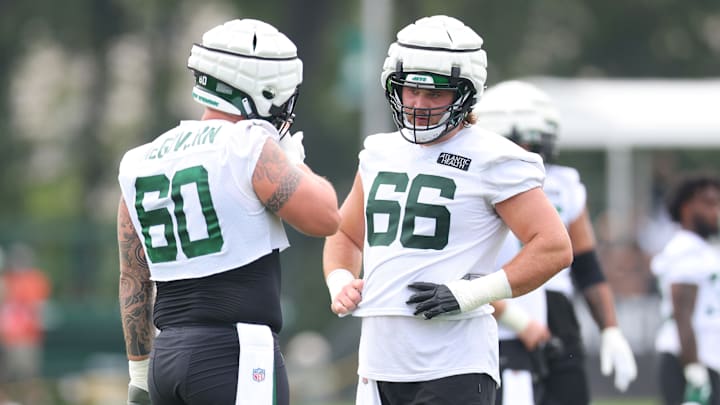The NY Jets have a small Super Bowl window with Aaron Rodgers at quarterback. While Rodgers is seemingly committed to playing at least two years in New York, his future beyond that is uncertain.
Rodgers will turn 40 years old later this year. The Jets didn't trade for the four-time MVP with the goal of winning 3-4 years down the line. They know that if they're going to win with Rodgers under center, it needs to happen soon.
Many of the moves the Jets made this offseason reflect that, but the lack of urgency shown with their 2023 NFL Draft class is a bit puzzling. A slow start to the career of second-round pick Joe Tippmann hasn't helped quell that concern, either.
Tippmann was expected, at least by some, to be a plug-and-play starter for the Jets. After all, when you draft a center with a high second-round pick, that probably should be the expectation.
With first-round pick Will McDonald expected to play a part-time role as a rookie, it seems imperative that Tippmann started early in his career to help maximize the year-one impact of the draft class. That doesn't seem likely to be the case, though.
Tippmann has worked exclusively with the third-team offense this summer. The Jets are holding an open competition for their starting center job, but that battle appears to be between the incumbent Connor McGovern and veteran backup Wes Schweitzer. Tippmann is not a serious candidate at this stage.
The NY Jets 2023 draft class will likely take a back seat this seat this year
It's always difficult for NFL general managers to balance between winning now and drafting for the future. Teams walk a fine line when it comes to addressing current needs and preparing for future ones.
The Jets opted more for the latter with both of their premium picks in this year's draft. That isn't a bad strategy in a vacuum, but given the team's razor-thin Super Bowl window with Rodgers, one would have expected them to show a bit more urgency.
The McDonald pick was a confusing one at the time, given the Jets' embarrassment of riches at defensive end. As it stands, the McDonald addition very well might render Bryce Huff's role in the defensive line rotation obsolete. McDonald essentially serves as Huff's replacement.
As for Tippmann, it may still be early, but it's hard to imagine the Jets will trust him enough to start Week 1, given where he's currently at on the depth chart. He hasn't even started snapping to Zach Wilson yet, let alone Rodgers.
The Jets had an opportunity to use two premium draft picks to increase their odds of capitalizing on their Super Bowl window. Instead, they drafted two players who likely won't play big roles this season.
This isn't to suggest that the McDonald and Tippmann picks were mistakes in a vacuum. It's far too early to project the futures of both players — there's every chance that both McDonald and Tippmann develop into long-term starters for Gang Green.
The issue lies in the fact that the Jets had holes to address. They could have made selections that were more impactful.
Someone like Jaxon Smith-Njigba would've given the team another offensive playmaker to pair with Garrett Wilson and Breece Hall. Someone like Brian Branch could've provided the Jets with a much-needed upgrade at safety in the second round.
The Jets prioritized future needs in this year's draft, instead relying on their pre-existing core and a handful of free-agent signings to build their roster around Rodgers.
Again, this isn't to say that McDonald or Tippmann were bad picks. It's August. Neither has played an NFL game. To suggest that would be downright absurd. It's the Jets' strategy, though, that seems misguided.
The Jets prioritized their future over the present. Given their tight Super Bowl window, that feels like a misstep.
